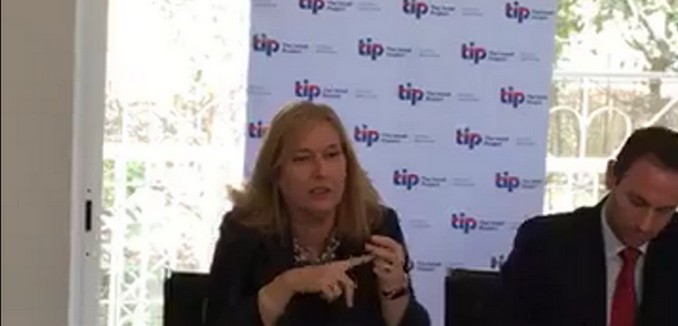During the recent violent riots held at Israel’s border with the Gaza Strip, Hamas “wanted to see its own people killed on the border while we tried to avoid it,” Former Israeli Foreign Minister Tzipi Livni, told a group of reporters hosted by The Israel Project Wednesday.
Livni’s charge accurately reflects statements made last week by Yahya Sinwar, the Gaza-based head of Hamas. Sinwar told Al Jazeera that “the sacrifice of” Palestinian children would serve “as an offering for Jerusalem and the Right of Return.” He also said that Hamas was prepared to sacrifice “that which is most dear to us – the bodies of our women and children” to achieve its goals.
Looking at the region, Livni identified Iran, Hezbollah and Hamas, as threats based on their religious ideology that does not accept the right of Israel to exist. She clarified that though the conflict she identified could be viewed as a religious war, it wasn’t a war between Muslims and all others, but between the believers in the extreme ideologies and others, including moderate Muslim states.
This breakdown, Livni argued, presented Israel with an opportunity to present a united front with the Sunni Arab states. What limits more active and public cooperation between Israel and its potential Arab allies is the Palestinian issue. Since the Arab League presented its peace initiative in 2002, it has been, what she called “the glass ceiling” limiting Israel’s cooperation with moderate Sunni states.
Livni expressed her belief that the only way forward for Israel is based on a two-state solution.
She added, however, that just as regionally there was a division between the extremists on one hand and the pragmatics on the other, the same dynamic existed among the Palestinians.
On the one hand there is Hamas that represents the religious ideology that isn’t even about establishing a Palestinian state. And even if they talk about establishing such a state, they don’t present it as being the end of the conflict. She pointed out that when Hamas won the Palestinian legislative elections in January 2006, the world decided that they could not achieve legitimacy unless they accepted Israel’s right to exist. This is something that even since 2006 Hamas has refused to accept.
Despite Israel’s withdrawal from Gaza, the fact that Hamas has refused to abide by the internationally recognized Quartet principles, recognize Israel and give up terror, puts Israel in what Livni called a “complicated situation.” Israel would like to leave the Gaza Strip alone but must defend itself.
But the situation in Gaza doesn’t just impact Israel from the standpoint of peace with the Palestinians but also in international fora. In the wake of last week’s violent riots, Israel finds itself being condemned by various institutions within the United Nations. Livni objected to these criticisms as it is Hamas, not Israel, that has failed to abide by the international consensus, leading to the recent violence.
A video of the briefing is embedded below.
[Photo: The Israel Project / YouTube]




